Castle ruins in Ireland: Abandoned castles and ruins
Castle ruins are a testament to Ireland’s fascinating history and captivating landscapes. From Dublin to Northern Ireland, Ireland is dotted with over 30,000 ancient fortresses and medieval castle ruins that transport visitors back in time. Whether you’re a history enthusiast or simply enchanted by the beauty of old-world architecture, exploring castle ruins in Ireland is a must.
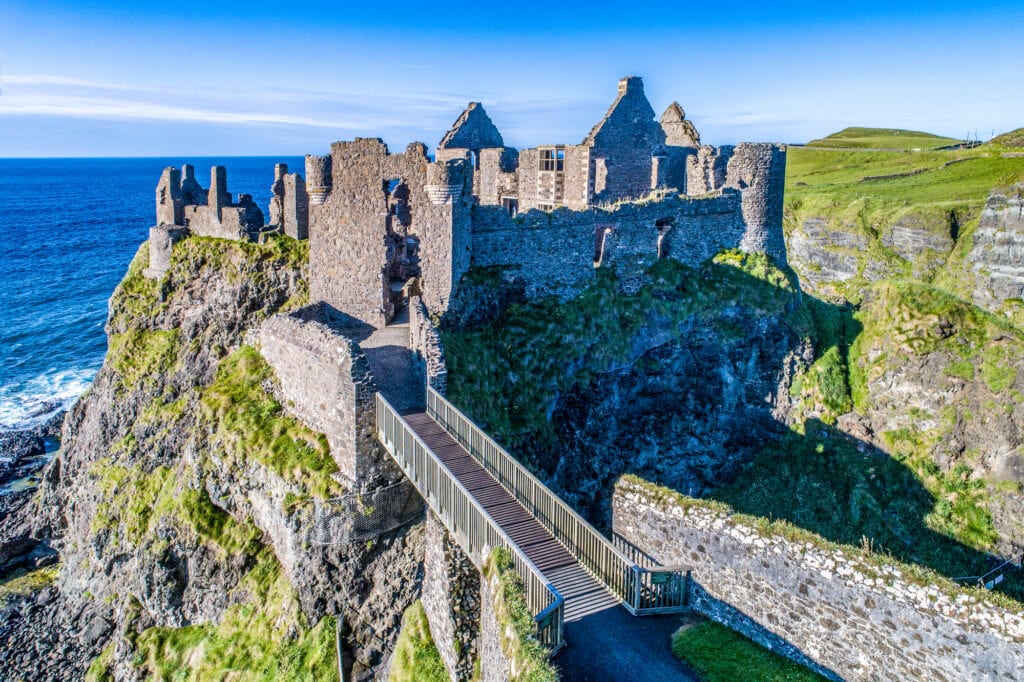
Most of Ireland’s castles date from the 12th to 16th centuries and I think I may have visited around 100 or so. Many are in such ruin and on private land which can make them difficult to get to but worth a hike through the fields.
- Castle ruins in Ireland: Abandoned castles and ruins
- What are the best ruined castles in Ireland to visit?
- What is a castle?
- Are there many haunted Castles in Ireland?
- The best 19 ruined Castles in Ireland to visit
- Dunamase Castle – County Laois
- McDermott’s Castle – County Roscommon
- Kinbane Castle – Northern Ireland- County Antrim
- Ballinskellig Castle – County Kerry
- Kildamhnait Castle – Achill Island
- Rockfleet Castle – County Mayo
- Leap Castle – County Offaly
- Athcarne Castle – Dulleek Co Meath
- Clifden Castle – Connemara Galway
- Rockstown Castle – County Limerick
- Dysart Castle – County Kilkenny
- Trim Castle – County Meath
- Dunluce Castle – County Antrim, Northern Ireland
- Sinone or Synone Castle – Tipperary
- Ballycarbey Castle – Ring of Kerry
- Roscrea Castle – County Tipperary
- Blarney Castle – County Cork
- Rock of Cashel – County Tipperary
- Castle Roche – Armagh Northern Ireland
- Lisronagh Castle – County Tipperary
- Exploring Castle Ruins in Ireland: The Ultimate Road Trip
Xyuandbeyond is reader-supported. When you buy through links on our site, we may earn an affiliate commission. You can read my privacy policy here.
What are the best ruined castles in Ireland to visit?
Some of the best ruined castles in Ireland to visit include Dunluce Castle, Rock of Cashel, the Rock of Dunamase, Leap Castle, Castle Roche, and Ballycarbery Castle.
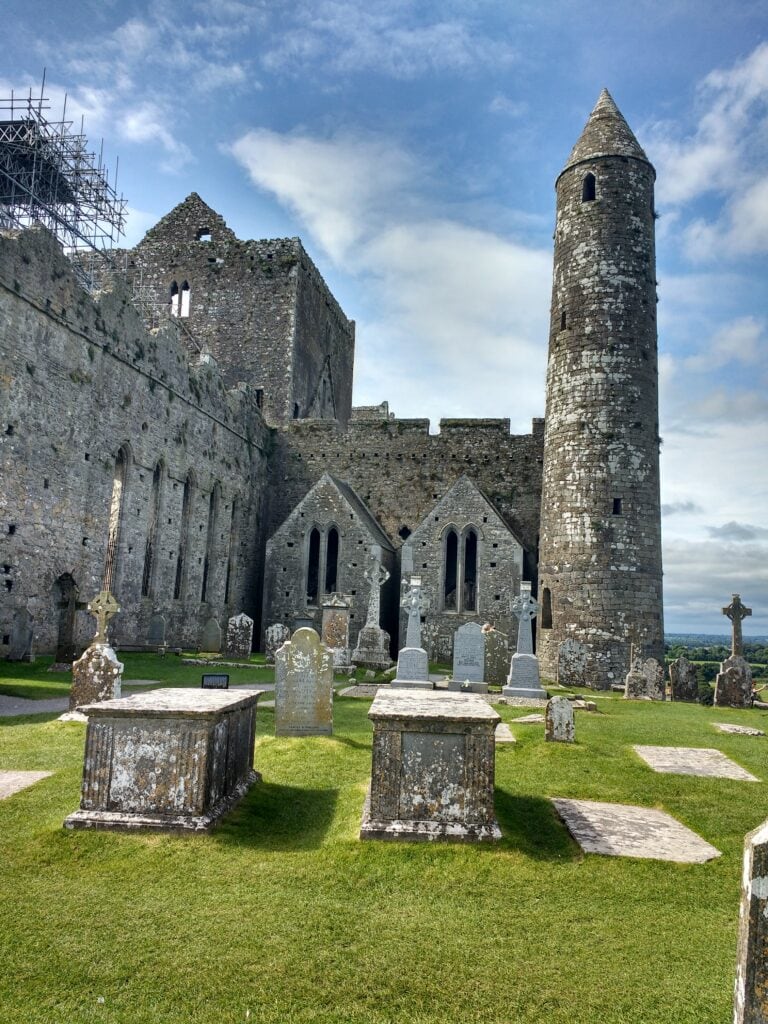
Plan a trip to the UK and Ireland
What is a castle?
Generally, however, castles are fortified structures that were the private residences of lords or noblemen. They are therefore distinct from palaces that are usually not fortified and tend to be royal residences. A castle is a type of fortified structure that typically originated in Europe during the middle Ages. It is usually characterized by walls, towers, and a moat, and was used as a residence for nobility, a military stronghold, or both.
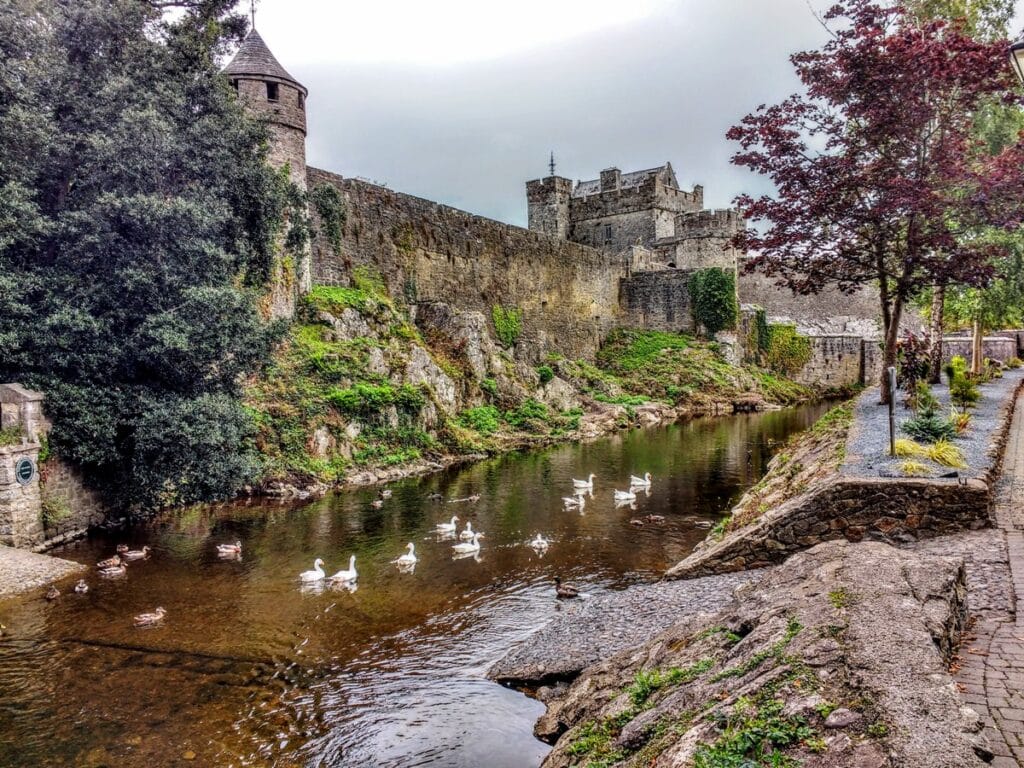
Are there many haunted Castles in Ireland?
Leap Castle is said to be the most haunted castle in Ireland but there are hundreds of haunted castles or at least castles with ancient tales of ghosts, banshees and troubled spirits.
The best 19 ruined Castles in Ireland to visit
Ireland is a land steeped in history, and its landscape is dotted with the hauntingly beautiful remains of abandoned ireland castles that must be explored. From the iconic Rock of Cashel perched atop a limestone hill in County Tipperary to the enchanting Dunluce Castle overlooking the wild Atlantic Ocean in County Antrim, each ruined castle tells a unique story of Ireland’s rich past. Here are 19 of my personal favourite you should visit when in Ireland.
Dunamase Castle – County Laois
The Rock of Dunamase Ireland is the seat of the ancient Kings of Laois in Ireland’s Ancient East. The Rock of Dunamase is the spectacular hill that the Castle of Dunamase sits atop and overlooks the Valley of the O’Moores just outside Portlaoise in County Laois. The Rock of Dunamase Laois stands over 45 metres high and the castle ruins are silhouetted against the sky.
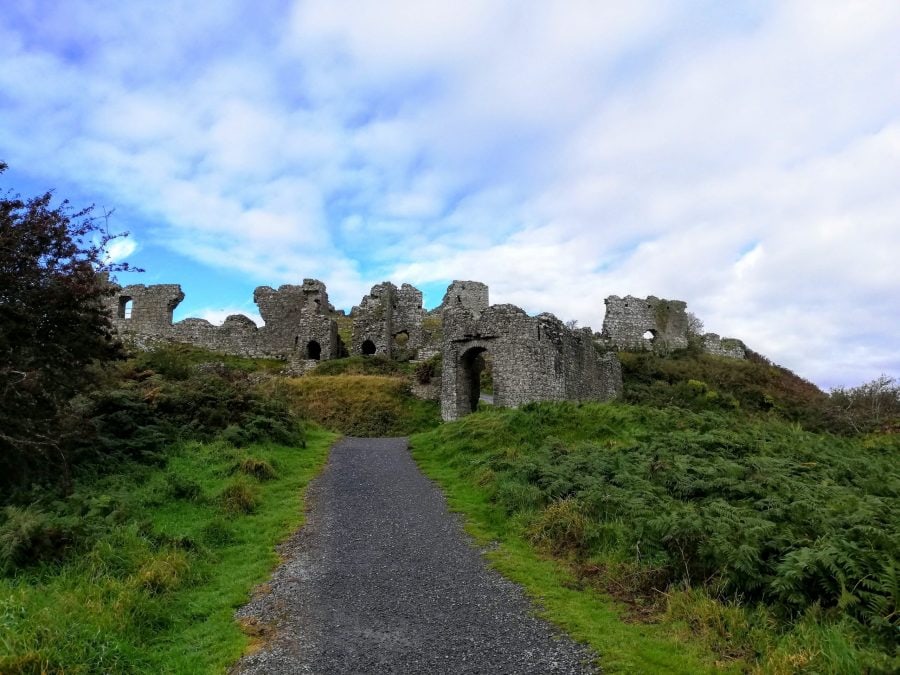
Dunamase began as an early Christian dun (fort) known as Dún Másc, meaning the ‘Fort of Masc’. The earliest references to the Rock of Dunamase appear in the Annals of the Four Masters which states that the Castle was plundered by Vikings in 843 AD. When the Normans arrived in Ireland during the 12th century the rock was refortified with the great hall and the earlier gate tower surviving from this period.
McDermott’s Castle – County Roscommon
Nestled on a small island that graces the picturesque woodlands of the Lough Key Forest Park in County Roscommon, McDermott’s Castle Island emerges as a timeless testament to history. This fairy tale castle, repeatedly razed, restored, and abandoned, boasts a tumultuous past.
In the 19th century, the visionary Welsh architect John Nash, renowned for his work on Buckingham Palace, took possession of Castle Island. It had lain abandoned for over three centuries, and Nash, inspired by creativity, constructed a folly castle for himself.
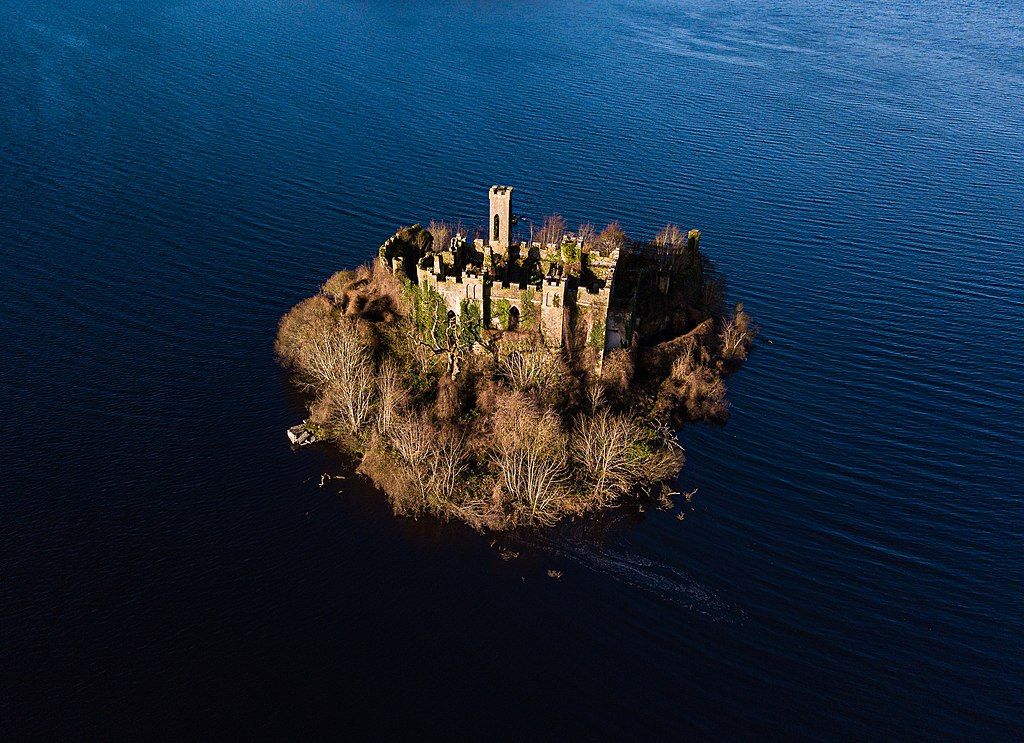
The roots of this abandoned castle trace back to the early Middle Ages, a time when Gaelic kings held sway over Ireland. During this era, Castle Island stood as both the abode and fortress of these ancient monarchs, bearing witness to their reigns and the pivotal events of the time.
Kinbane Castle – Northern Ireland- County Antrim
Not much of the castle remains, and the path up to it is narrow and stepped with over 140 steps to traverse. Kinbane Castle is a State Care Historic Monument sited in the town land of Cregganboy, in Causeway Coast and Glens Borough Council area. The area surrounding Kinbane Castle is a Scheduled Historic Monument; it also offers spectacular views of Rathlin Island and Dunagregor Iron Age fort.
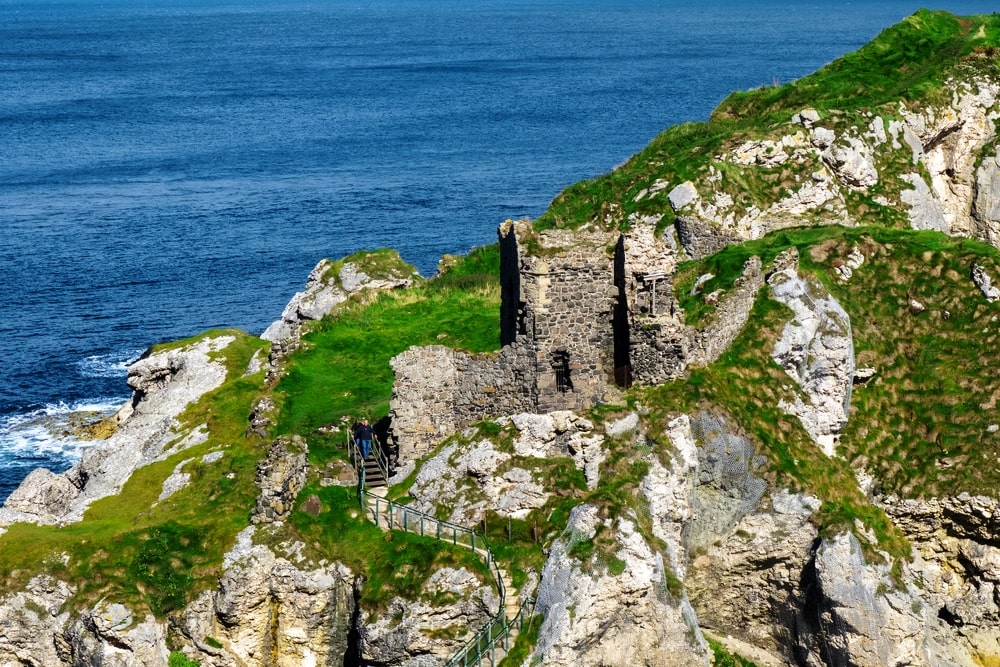
Ballinskellig Castle – County Kerry
The Ballinskelligs Castle ruin was a stronghold of the McCarthy’s who tribal chiefs were back in the 16th century and legend holds that it was constructed to defend the bay from pirates. It is prominently located and it is in a relatively good state of preservation.
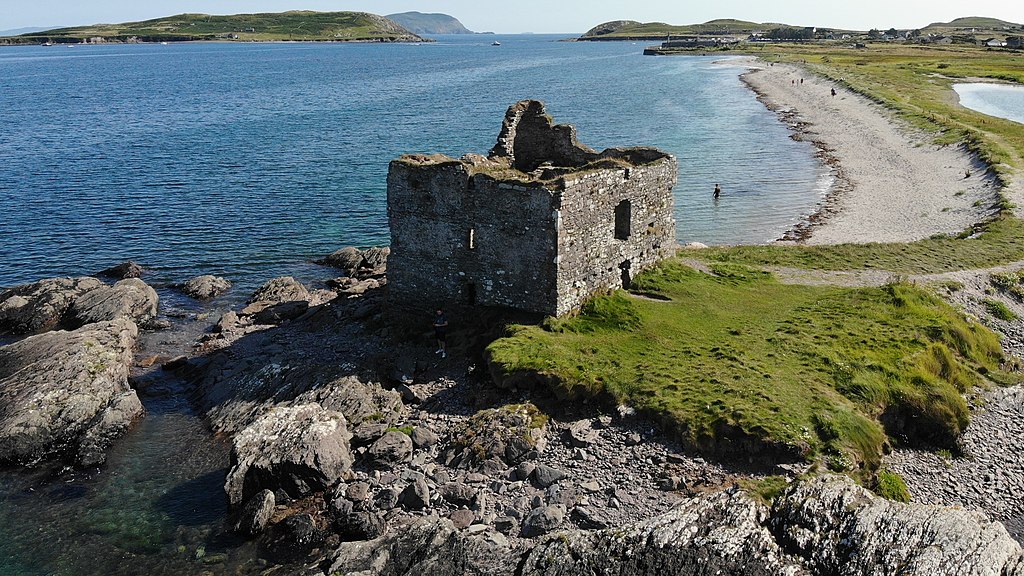
A more romantic version of its history is that it was built much earlier, during the 12th and 13th centuries when battles were taking place between the Gaelic King of Desmond, McCarthy Mór who ruled South Kerry and the Geraldine Earl of Desmond, who ruled North Kerry.
Kildamhnait Castle – Achill Island
Kildamhnait Castle, on the southeast coast of Achill Island, is a 15th-century tower house associated with the O’Malley Clan (Grace the Pirate Queen’s family), there is also a 16th-century church, graveyard and holy well you can visit.
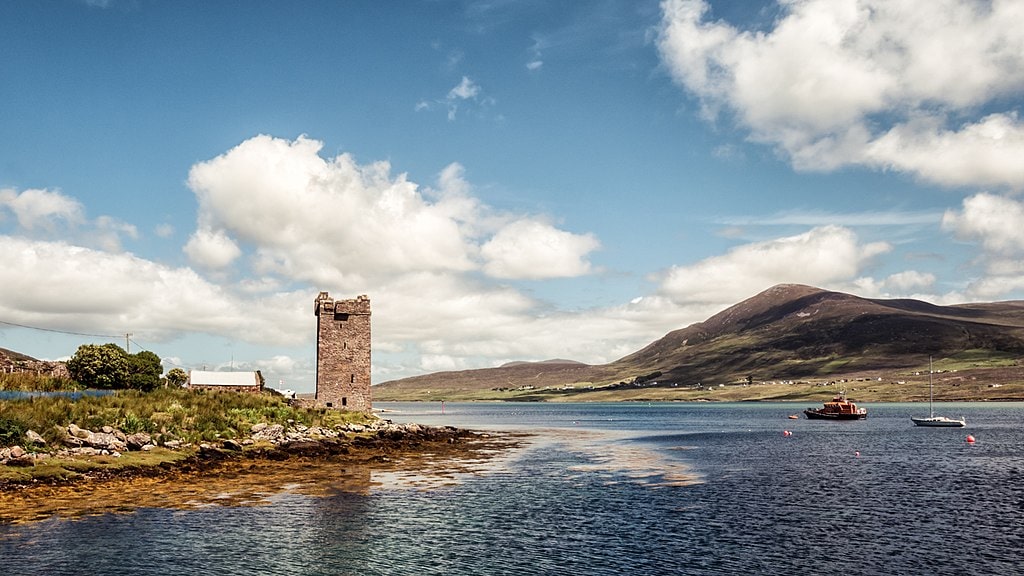
Rockfleet Castle – County Mayo
Rockfleet is a tower house that was built in the mid-16th century. It was home to Pirate Queen Grace O’Malley and her husband Richard Burke ‘Richard of Iron’ from 1566. O’Malley is believed to have died here. The castle was restored in the 1950s and is open to the public in the summer season.
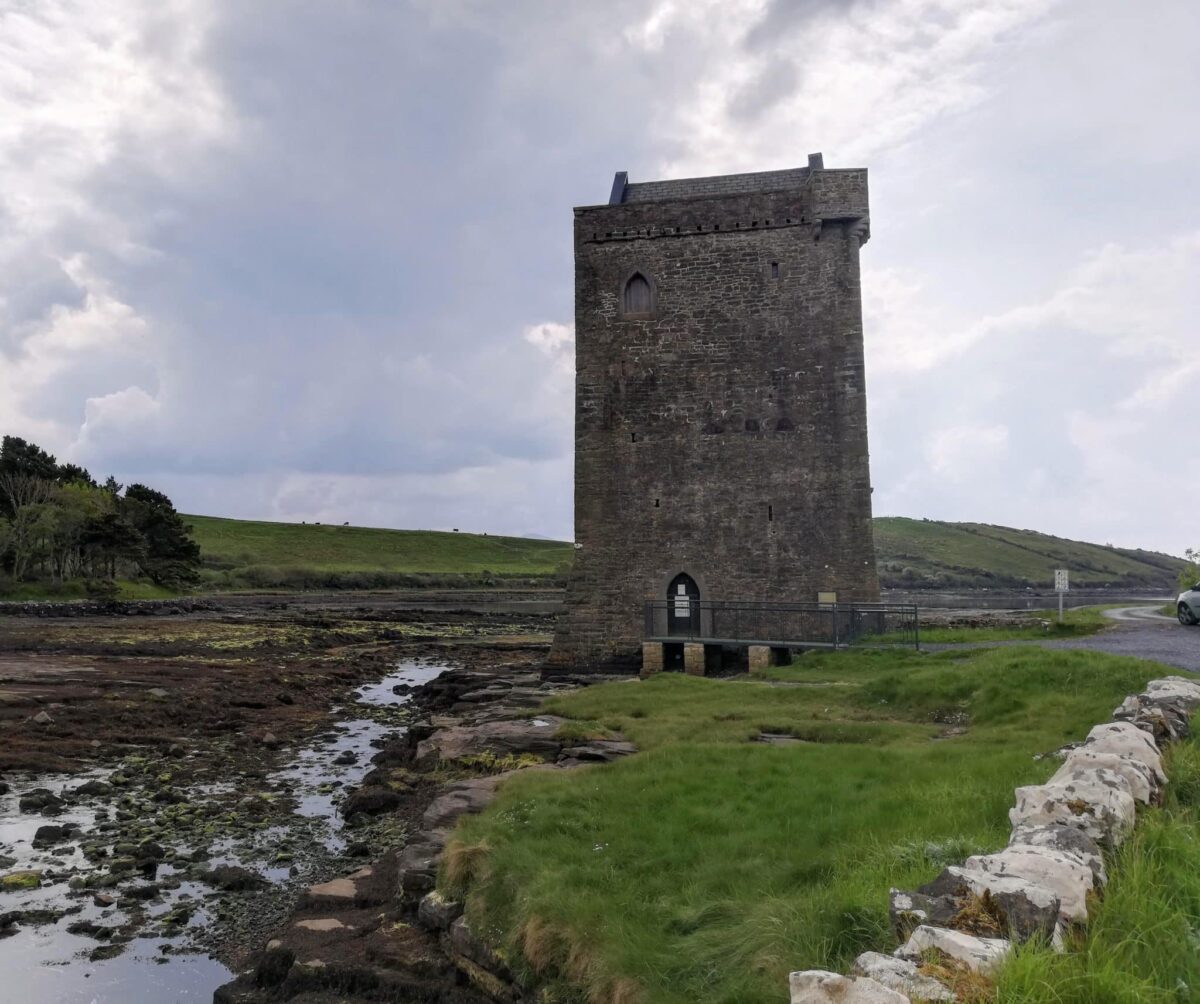
Grace O’Malley was born around 1530 near Westport to Owen O’Malley, the chieftain of a clan that ruled the area around Clew Bay on the west coast of Ireland for more than 300 years. During that time, they built wealth from both piracy and legitimate trade with France and Spain.
Leap Castle – County Offaly
Leap Castle is world-renowned as the most haunted castle in Ireland if not the world. Its dark halls and history contain many secrets and tragedies. Leap Castle is privately owned by Irish musician, Sean Ryan, who has been restoring the property since he bought it in the early 1990s. Said to be haunted by a sadistic chieftain, the original 16th century fortress is mostly ruins.
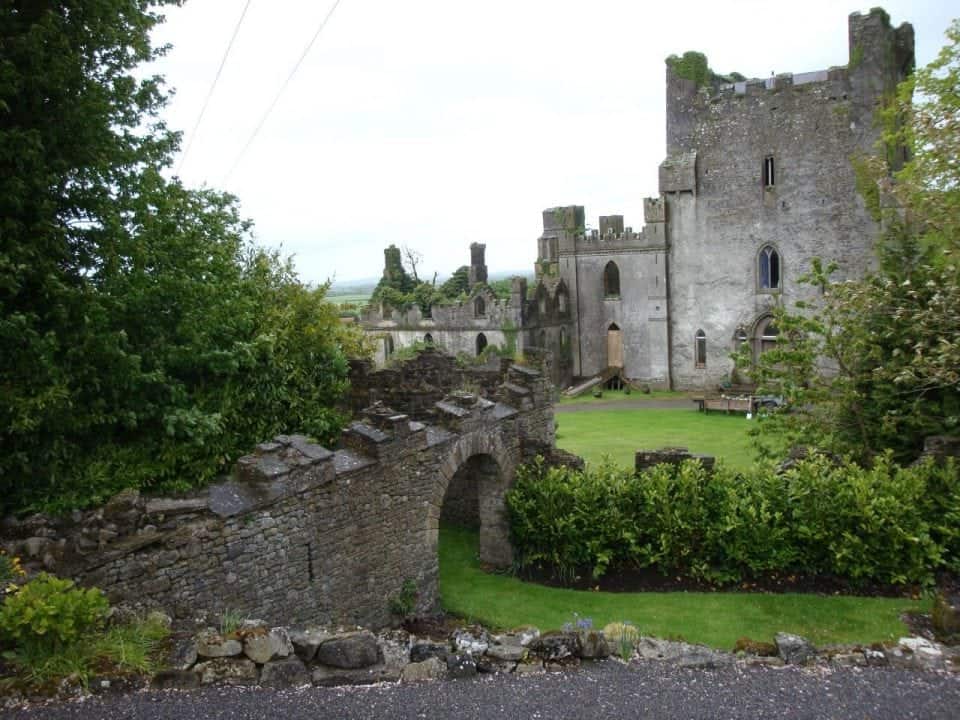
The “Bloody Chapel” tale at Leap is allegedly where a murder between a Priest and his brother took place during high mass is just one tale. The oubliette is home to many secrets of a dark and terrifying past. In 1922 workmen at Leap Castle found the oubliette in a secret dungeon hidden behind a wall in a corner of the Bloody Chapel. When they explored the dark hole further they made a horrific discovery – there were enough human skeletons amassed on top of wooden spikes that it would take three cartloads to remove them for a Christian burial.
Athcarne Castle – Dulleek Co Meath
This castle was built in Meath 1590 so it is Elizabethan in its architecture. A ruin now is supposedly haunted by the ghost of the fallen King James. He died in the nearby Battle of Boyne and reportedly stayed in the castle just prior to his death. Also heard are the agonized screams of soldiers who died at Boyne.
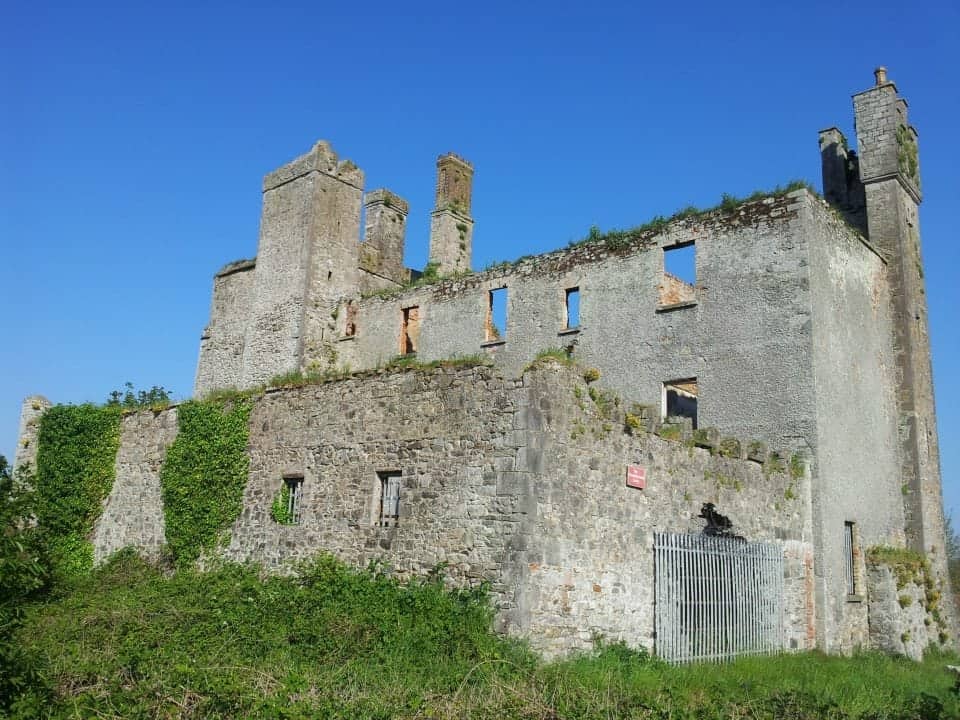
Clifden Castle – Connemara Galway
Clifden Castle in Connemara near the town of Clifden was built in the 19th Century but went into decline during the Great Famine of 1845. The castle is said to be haunted by the spirits of the poor and deprived who sheltered in the castle grounds during this period.
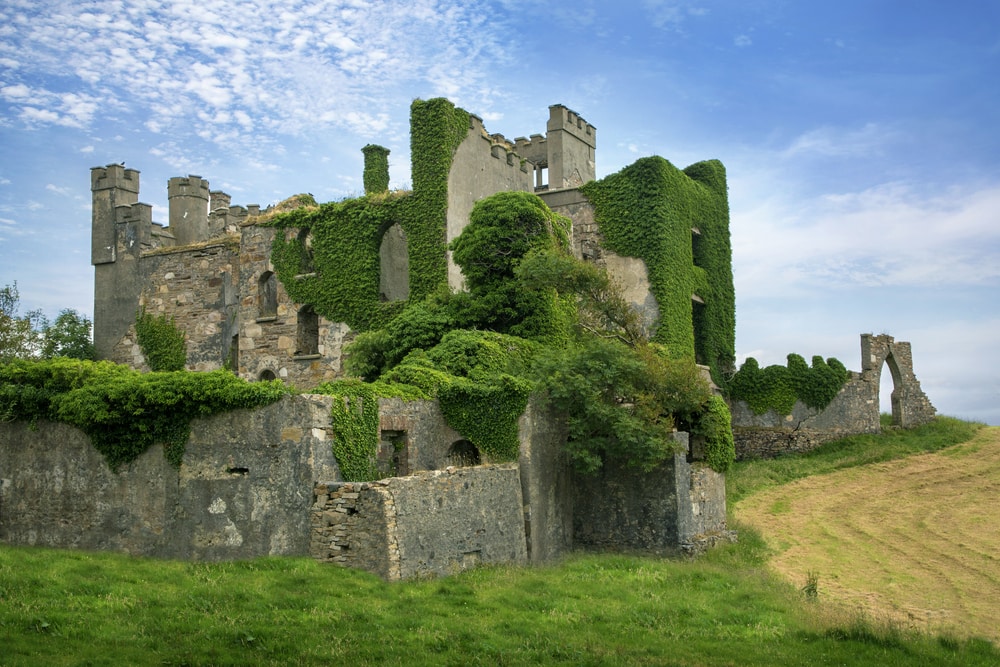
Rockstown Castle – County Limerick
Rockstown Castle, which was built around the 15th Century, sit on top of the cliffs with a base of solid rock. There are breathtaking views of the countryside and you can head up the stairway to the top. is one of the most medieval ruins I’ve been to. The name pretty much says it all, it’s on top of a rock, on a hill, which gives it a quite privileged (should I say breath-taking?) view of the countryside. Most rooms are accessible and the stairway leads you all the way to the very top, which is all covered by ivy and flowers.
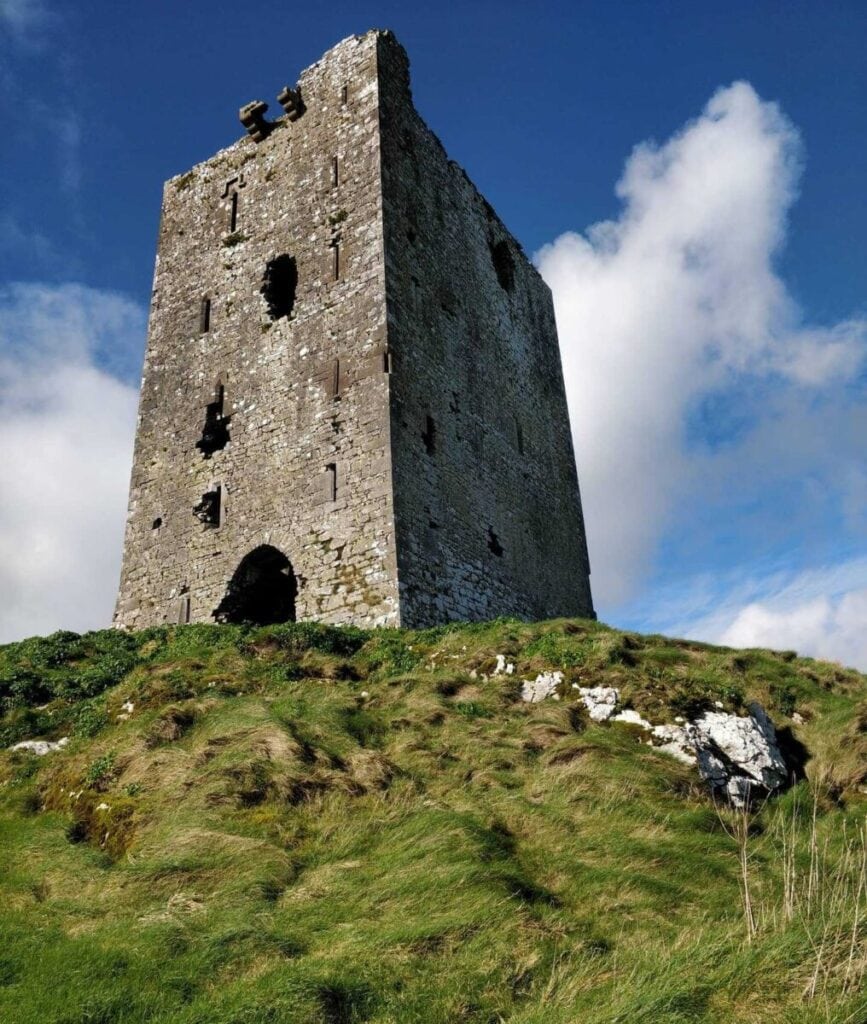
Dysart Castle – County Kilkenny
Everyone has heard of Kilkenny Castle on the medieval mile but few are aware of the 17th century Dysart Castle ruins just outside Kilkenny in Thomastown.
Around 1200 was granted by George FitzRobert to Kells Priory. The priory retained possession until its suppression in 1540. The Castle itself dates roughly from the 14th Century. The building at the moment is in a perilous state and is in urgent need of restorative work.
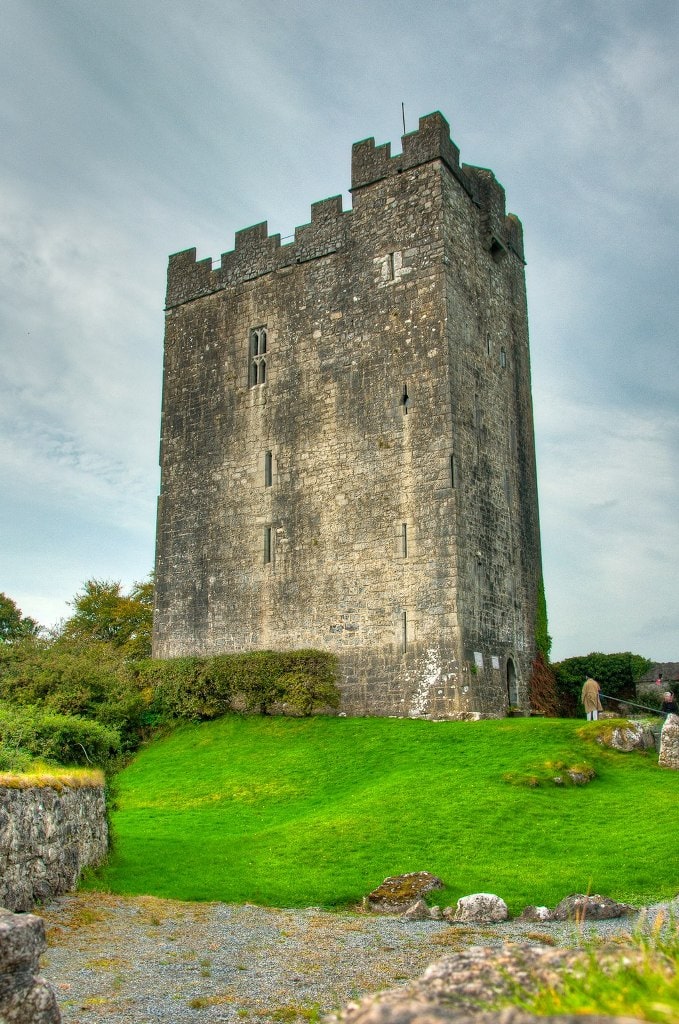
Trim Castle – County Meath
Located in County Meath, Trim Castle is the largest and one of the most impressive Norman castles in Ireland. Built in the 12th century by Hugh de Lacy, this majestic fortress stands proudly on the banks of the River Boyne. As you wander through its hallowed grounds, you’ll be transported to a time when knights roamed the land and battles were fought for power and glory.
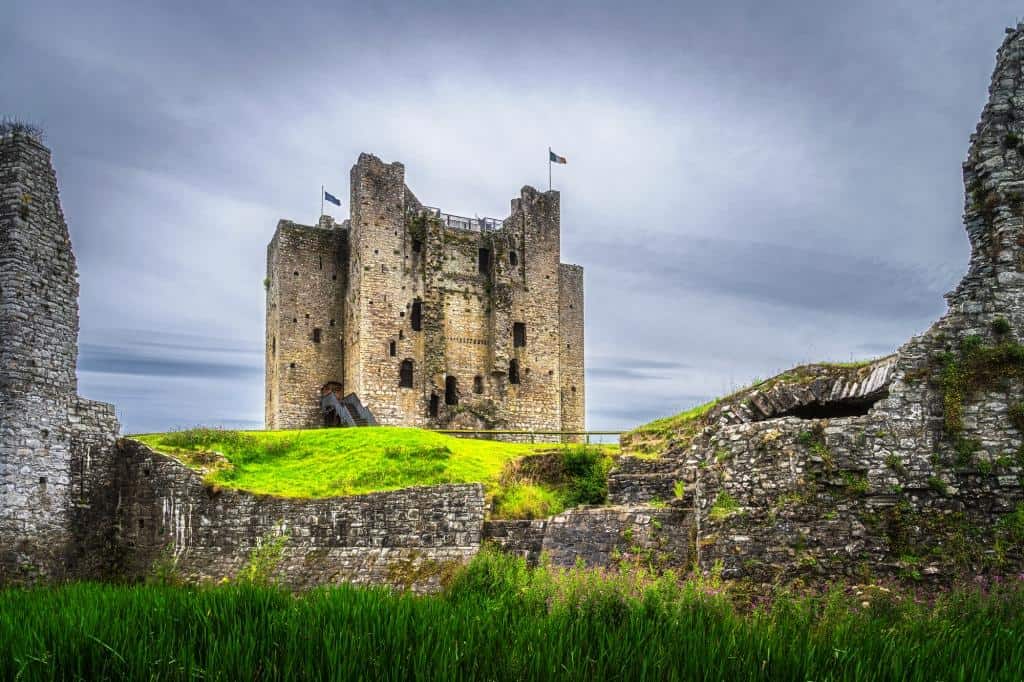
Dunluce Castle – County Antrim, Northern Ireland
Perched dramatically on a cliff edge overlooking the wild Atlantic Ocean, on the Causeway Coastal route Dunluce Castle is a striking sight to behold. This medieval ruin dates back to the 13th century and was the seat of the powerful MacDonnell clan. Dunluce is said to be haunted by the screams and corporeal manifestations of those who fell to their deaths when the kitchens collapsed into the Sea of Moyle.
The MacDonald family abandoned the castle in 1690 at the time of the battle of the Boyne. Today, Dunluce Castle still belongs to the MacDonald’s; however, it is managed by the Northern Irish Environment Agency.
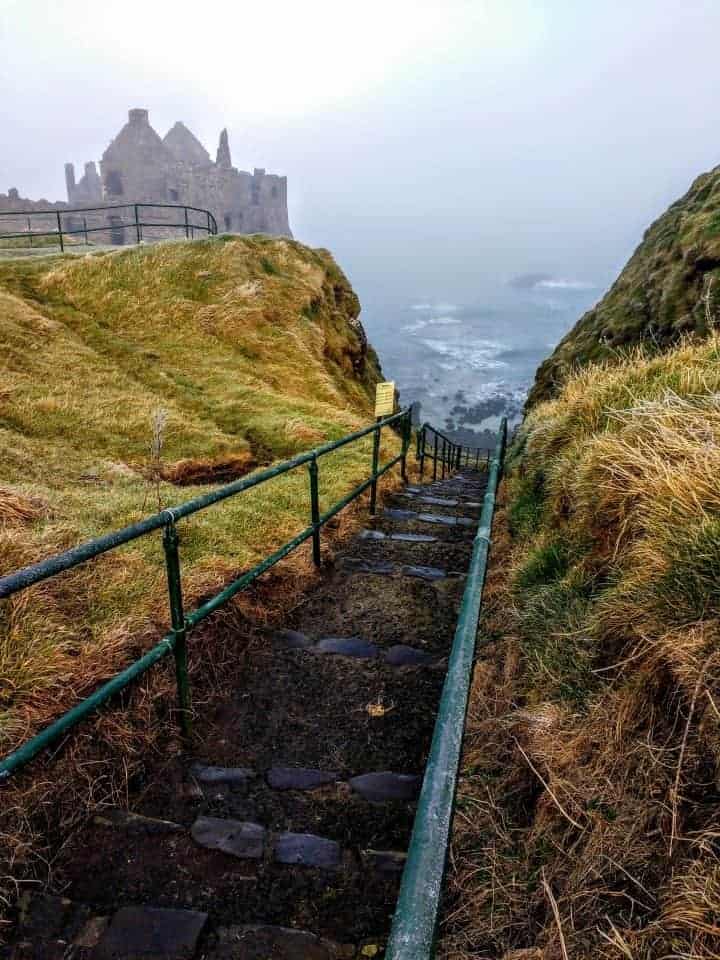
Sinone or Synone Castle – Tipperary
Synone Castle is a circular tower, known in Gaelic as Farrin-a-Urrigh and history tell us that many of Stongbow’s forces in retreat from Cashel were attacked and buried there. Human bones are frequently dug up near the tower and a few years ago a large helmet was discovered. Synone Castle used to be the residence of the Butler family and Cromwell is said to have attacked it at some point.
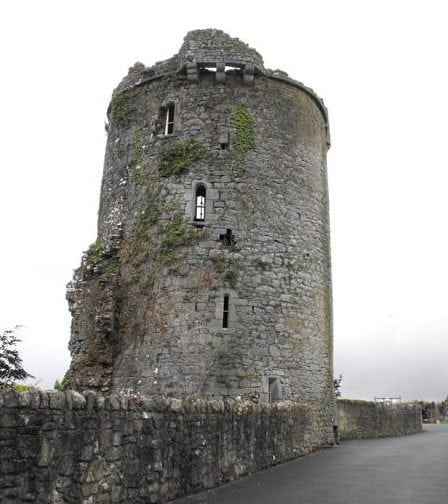
Ballycarbey Castle – Ring of Kerry
Just outside Caherciveen on the Ring of Kerry you can visit Ballycarbery Castle which sadly is inaccessible but you can get some great photos from a distance. Situated near the water’s edge you will see the remains of the castle with its ivy-covered tower house which was once home to the McCarthy Clan and built sometime in the 15th century. It is probably the largest and most impressive castle built on the peninsula of Iveragh and is still very impressive from a distance. However, it has been forgotten and neglected for hundreds of years.
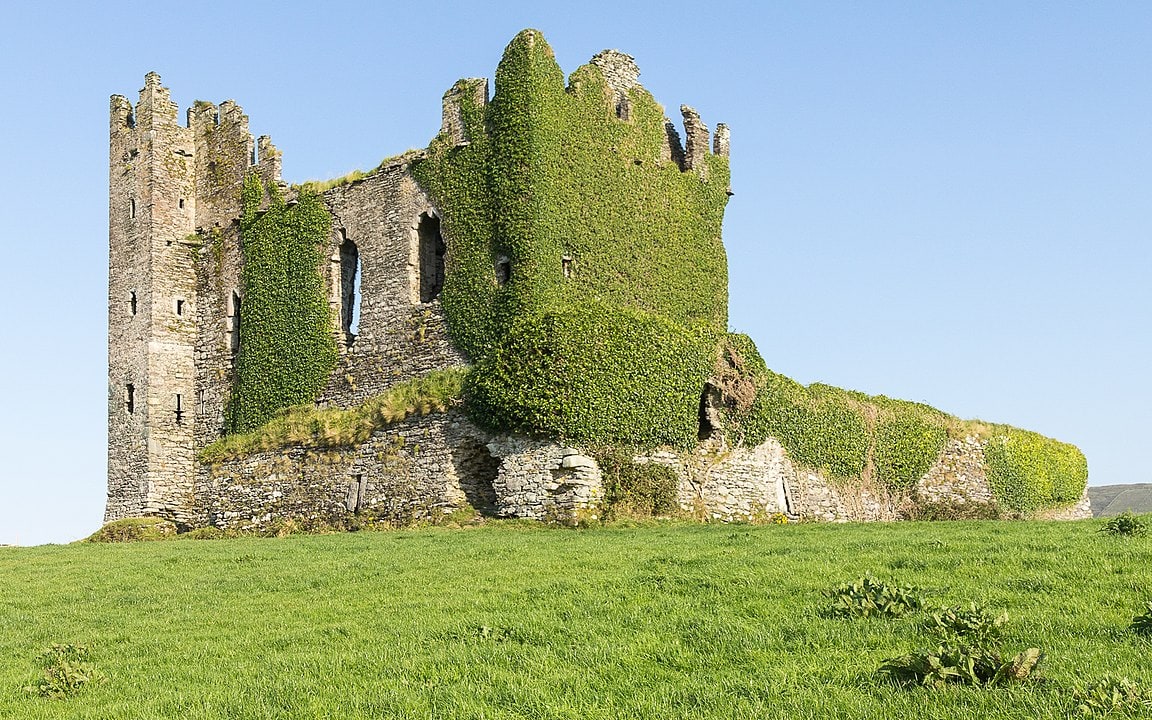
Roscrea Castle – County Tipperary
In the heart of Roscrea in County Tipperary, one of the oldest towns in Ireland, you will find a magnificent stone motte castle dating from the 1280s. It was used as a barracks from 1798, housing 350 soldiers, and later served as a school, a library and even a sanatorium.
Originally it was wooden and built for protection purposes in Motte and Bailey style but in 1281 the castle as it stands today was rebuilt. It contains a gate tower, two corner towers and curtain walls.
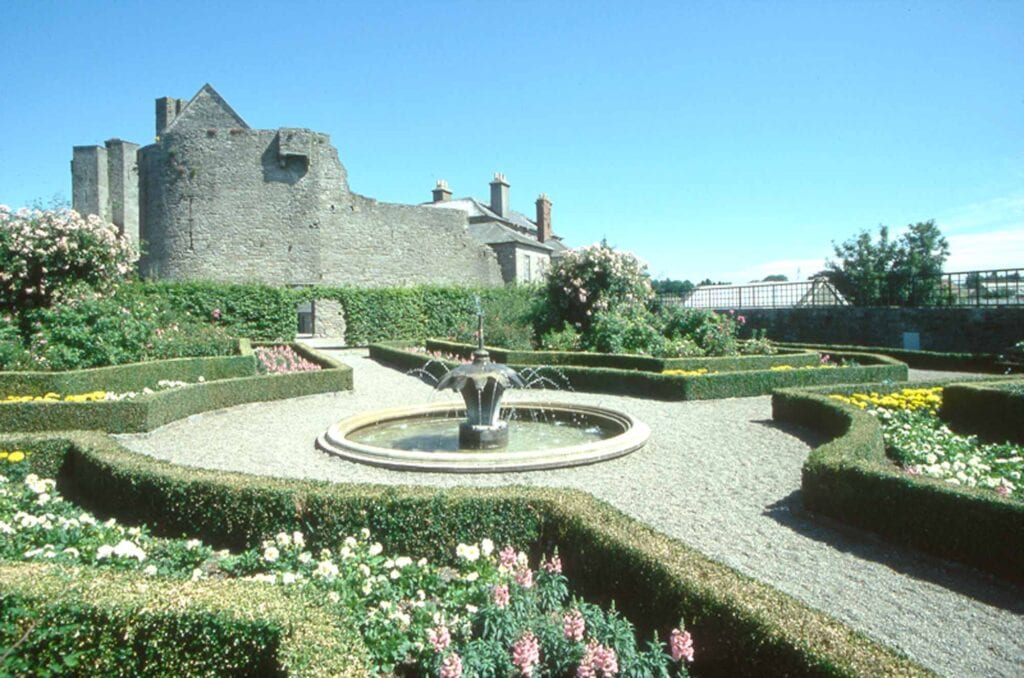
Blarney Castle – County Cork
Probably one of Ireland’s most famous landmarks the legend of the Blarney Stone is one that many tourists pilgrimage to. Not my idea of fun as you have to hike up many narrow and worn stairs and then take care that someone has a good grip on you as you bend over backwards to kiss the stone. But it does seem to be high on many a bucket list.
Rock of Cashel – County Tipperary
The most famous Irish castle ruins are of course The Rock of Cashel (also known as St. Patrick’s Rock) rises out of the landscape as you approach it placed high on top of limestone outcrops where it oversees the fertile landscape of Tipperary. Resolute stonewalls circle a round tower, a 13th-century Gothic cathedral and an exceptional 12th-century Romanesque chapel containing some of Ireland’s oldest frescoes. One of Ireland’s stunning archaeological sites, The Hill of the Rock is located on is banded with limestone outcrops rising up to the green mound that the Rock sits on.

Castle Roche – Armagh Northern Ireland
Castle Roche, which appears to be based upon Beeston Castle in Wales, served as a vital strategic stronghold on the frontier between Ulster and the Pale, controlling the pass into what is now South Armagh. It’s on private property but can be reached via a country lane off either the N1 or N53.
The Castle is believed to have been built in 1236 by Lady Rohesia de Verdun after the death of her husband. The story goes that she promised her hand in marriage to the architect who would build her a castle at Roche. When he went to claim her hand, she had him thrown from one of the windows, which to this day is known as the ‘murder window’.
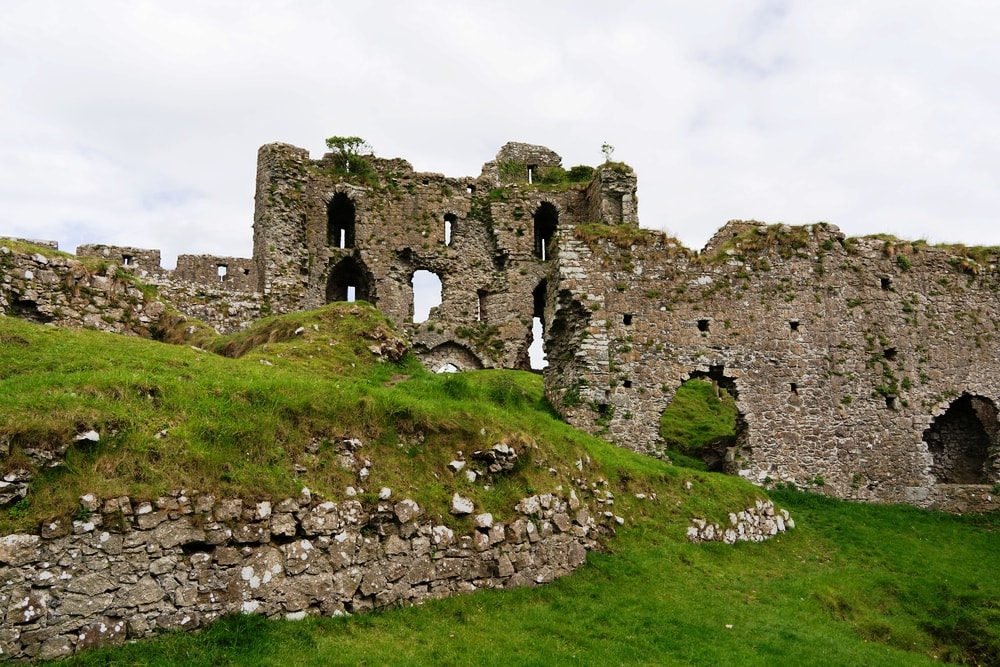
Lisronagh Castle – County Tipperary
Lisronagh has been inhabited since at least the medieval period and was held by the Anglo-Norman de Burgh family from the time of Henry II. A rare surviving document, the rental of the manor of Lisronagh, dates to 1333 and describes the local lord’s landholdings, the rents owed by local tenants, and the rights which the village’s inhabitants possessed. The powerful Butler family built a tower house in the village in the 16th century, which is now a ruin.
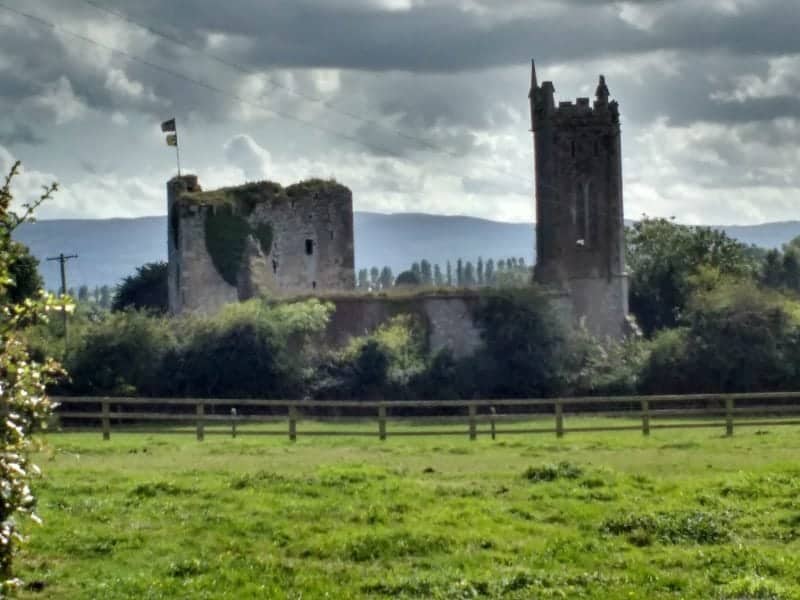
Exploring Castle Ruins in Ireland: The Ultimate Road Trip
If you’re a true castle enthusiast, embarking on a road trip to explore castle ruins across Ireland is an adventure you won’t want to miss. The island’s diverse landscapes, from rugged coastlines to rolling green hills, provide the perfect backdrop for discovering these ancient treasures. Consider a visit to Bunratty Castle in County Clare, or perhaps you want to stay in a luxury Castle hotel such as Ashford Castle. Each of these castles offers a different glimpse into Ireland’s storied past and is sure to leave you breathless.
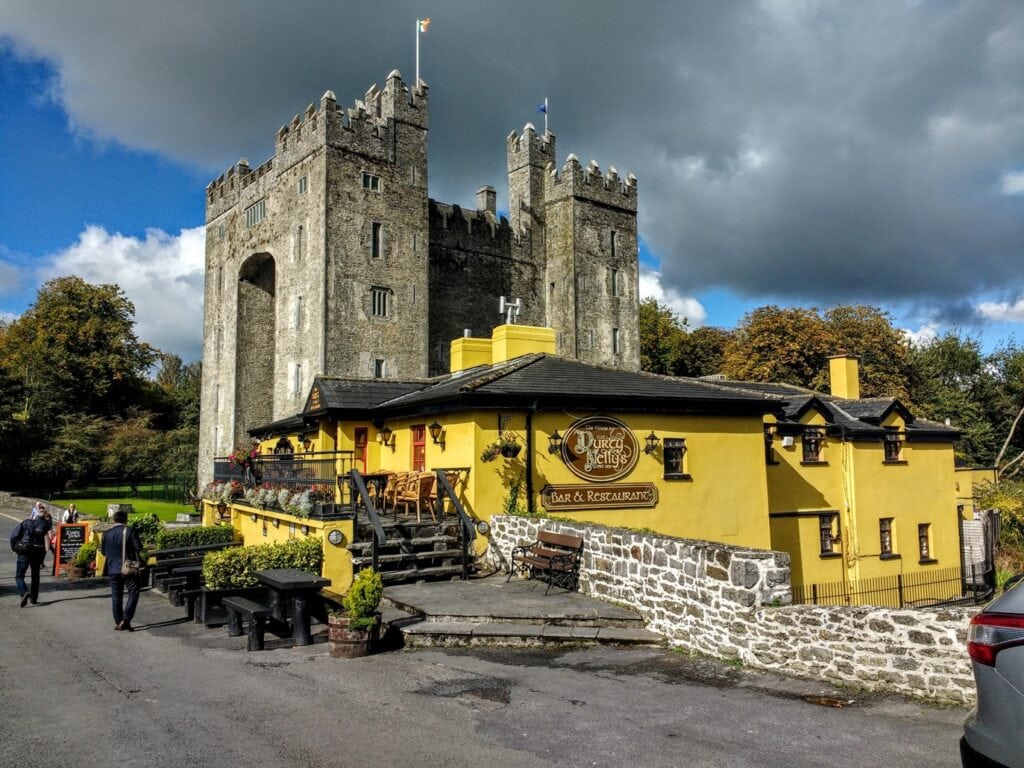
From the haunting beauty of Dunluce Castle to the majestic grandeur of the Rock of Cashel, visiting Ireland’s castle ruins gives you a chance to journey into Ireland’s rich history and architectural legacy. Whether you’re exploring Kilkenny Castle the best preserved castle in Ireland or visiting treasures such as Birr Castle and its famous science centre or the beautiful Cahir Castle or the 15th century castle of Bunratty on the banks of the River Shannon or simply embarking on a road trip to discover the hidden gems of ruined castles you will find them all in Ireland.
There are literally hundreds of abandoned Irish castles and often you will spot a brown heritage sign of the roads which will lead you to abandoned castles for sale in Ireland, keep in mind the repairs and restoration can be stunningly expensive but hey if you want to buy a castle Ireland is the place to do it.
Pin it to save it
